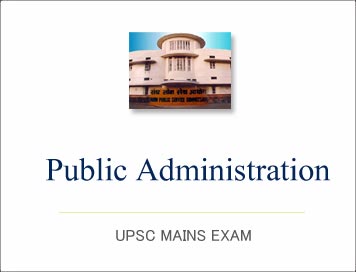(Download) UPSC IAS Mains Exam 2017 - PUBLIC ADMINISTRATION (Paper-2)

(Download) UPSC IAS Mains Exam 2017
PUBLIC ADMINISTRATION (Paper-2)
Exam Name: UPSC IAS Mains Public Administration (Paper-II)
Marks: 250
Time Allowed: 3 Hours
SECTION A
Q1. Answer the following questions in about 150 words each:
(a) “Constitutionalism is the foundation of the administrative edifice e
in India.” Discuss (10 Marks)
(b) “The status and functioning of the Cabinet Secretariat face a stiff
challenge from the Prime Minister’s Office (PMO).” Argue both in favour and
against the contention. (10 Marks)
(c) “Effectiveness of local-self government institutions is hampered due to
the lack of capacity building of the elected representative s.” Elaborate
(10 Marks)
(d) “Public Sector Undertakings (PSUs) in India face tough competition from
the private enterprises and Multi-National Corporations (MNCs) . “ Explain
(10 Marks)
(e) Do you agree that “All India Judicial Service (AIJS) would contribute to
timely delivery of justice to the citizens? Argue your case (10 Marks)
Q2.
(a) “The market reforms have not infringed the basic structure of the
Constitution of India, but have largely compromised the realization of the
ideals of social and economic justice.” Comment (20 Marks)
(b) “The idea of lateral entry into the Civil Services would energies Indian
administration.” What are its possible advantages and limitations? (20
Marks)
(c) “Pro-Active Governance and Timely implementation (PRAGATI) is an
innovative project of the Union Government.” Discuss its features and modalities
(10 Marks)
Q3.
(a) “The position of council of ministers in a state is reduced to that of
a body of a secretaries in the presence of a domineering of chief minister.”
Critically analyse with examples (20 Marks)
(b) “Indianisation of Public Services is a slow but steady process.” Explain
(20 Marks)
(c)” Digitalization of land records is a necessary but not sufficient
precondition for ensuring transparent district administration.” Explain (10
Marks)
Q4.
(a) “ Bureaucracy has to make a balance the need for environmental
sustainability and developmental imperatives .” Discuss (20 Marks)
(b) “The chief secretary is often termed as the alter ego of the Chief
Minister.” Discuss, with examples, the dynamics of their relationship in State
administration. (20 Marks)
(c) ’District Planning Committee (DPC) has been the weakest structure in the
local self-government mechanism in India .” Analyze with examples (10 Marks)
SECTION B
Q5. Answer the following questions in about 150 words each:
(a) “The institution of Gram Sabha has very little connection with the
Gandhian spirit of direct democracy.” Critically examine (10 Marks)
(b) “There is a need for greater inclusion of technocrats in burearocracy to
ensure effective governance in India.” Do you agree” Elucidate (10 Marks)
(c) “Civil servants should avoid airing grievances in the media.” In the
context , discuss the grievance redressal mechanisms available to the Civil
Servants in India. (10 Marks)
(d) Do you think k that Public Service Guarantee Act s passed by various
State Governments are an extension to the Citizen Charter? Give reasons (10
Marks)
Q6.
(a) “The Prime Ministers awards for Excellence in Public Administration
encourage good governance initiatives. “ Discuss some such initiatives by the
Civil Servants in this context. (20 Marks)
(b) “Implementation of Goods and Services Tax (GST) has led to a paradigm
shift in the Centre-State relations , both financially and politically .”
Analyze with examples (20 Marks)
(c) “The Right to Information (RTI) has started its journey but is far from
its destination.” Comment (10 Marks)
Q7.
(a) “Disaster preparedness and management has become an important
component of district administration in India.” Discuss with suitable
illustrations (20 Marks)
(b) In view of the contemporary internal scenario should “law and order” be
made a part of the Concurrent List of the Constitution of India? Justify your
opinion (20 Marks)
(c) ”The image of Indian Police can be improved if its structure and
orientations are transformed radically.” Do you agree? Elaborate (10 Marks)
Q8.
(a) Discuss, with sustainable examples, the emerging challenges faced by
the Regulatory Commission s as to the arbitrary agents between the State and the
market forces (20 Marks)
(b) “The ‘policy of non-action’ regarding the institutional mechanisms and
legal provisions to eradicate corruption is a feature of Indian Administration.”
Critically examine (20 Marks)
(c) “The Second Administrative Reform Commission (ARC) makes a strong case
for the principle of subsidiary .”Elaborate (10 Marks)

